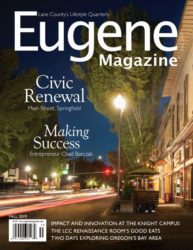Balancing personal and professional relationships is not always easy, and it can be especially challenging when the person you’re working with is your parent. We spoke with father-and-son teams from seven local establishments about how they got started in their businesses and how they manage to find this balance.
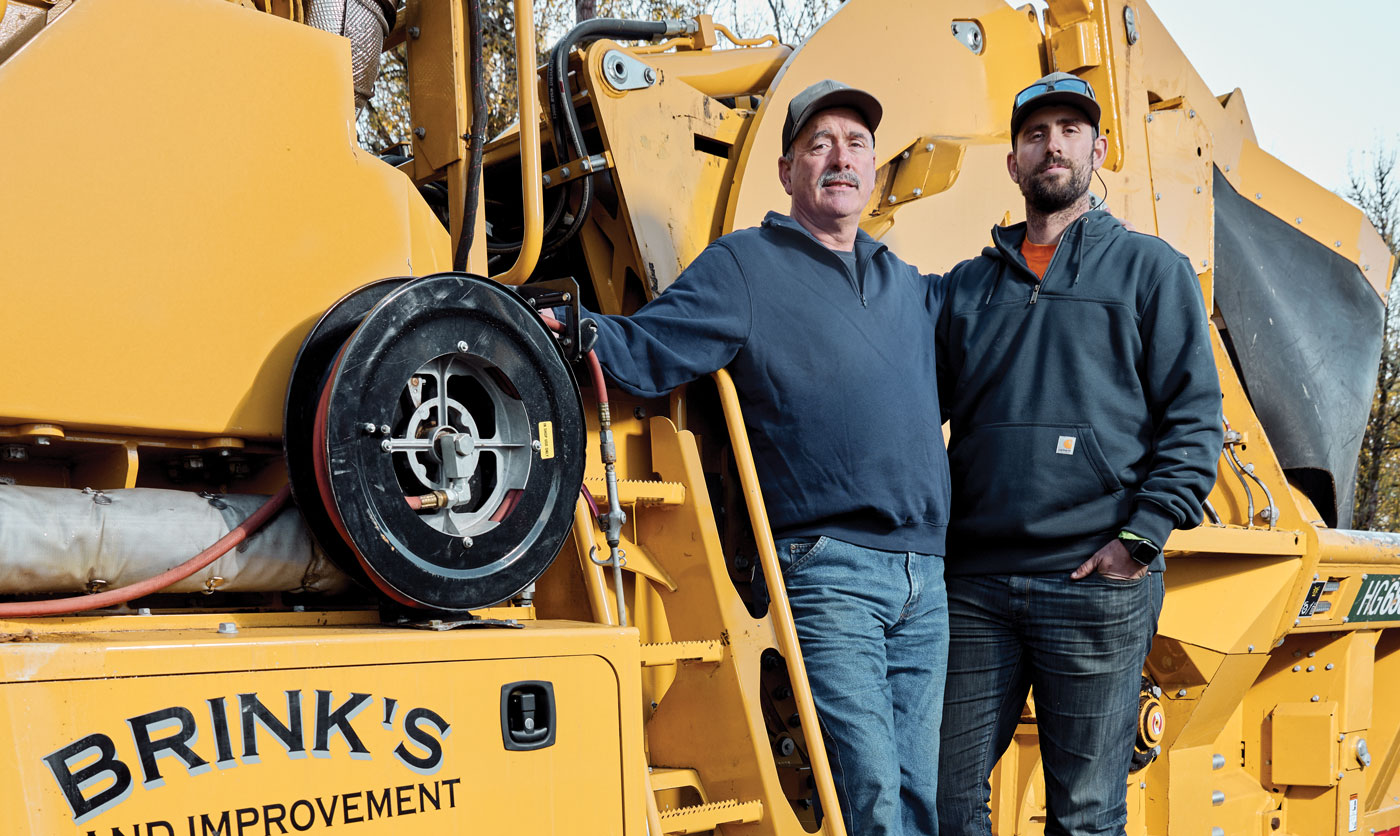
Brink’s Land Improvement
Brink’s Land Improvement, based in Pleasant Hill, was founded in 1981 as a logging company by Jeff Brink’s father, Mark, and Mark’s four brothers. Mark became the sole owner in 1986, and owned Brink Brothers through 2008. At that time, Mark stepped away from logging. He sold his equipment and purchased one of the state’s first masticator machines, which are used in land clearing and wildfire fuel reduction. Jeff worked with his father and other employees through high school and college. After he graduated from Oregon State with a degree in construction engineering management, Jeff worked intermittently at the company and in Hawaii for three years. In 2017, he joined his father at the company helm and is carrying the torch of the business for the family. Today, Brink’s specializes in large-scale fuel reduction and land clearing for governmental groups like Oregon Department of Transportation and various cities and counties, along with land clearing for residences. They cleared the land along the McKenzie River after the 2020 Holiday Farm Fire and worked on the recent Cedar Creek Fire near Waldo Lake, clearing fuel and creating fire breaks. “We travel all across the state serving in fuel reduction and water restoration, land clearing for commercial vineyard development, hazard tree removal, and things of that nature,” says Jeff. “I have multiple mentors in roles in the forestry industry from my family. And I was brought up with business acumen, and I enjoy working for myself and working outside. It’s all the things that I enjoy.” Jeff says he and his father are both capable and confident in each other’s decision-making. When two people put their lives on the line for a business’s success, feelings can get passionate, but the two have always managed to have their disagreements and still spend family time together and enjoy life beyond the business. “My dad is a great friend, and we work really well together and enjoy getting a lot done, which we do,” he says. brinkslandimprovement.com
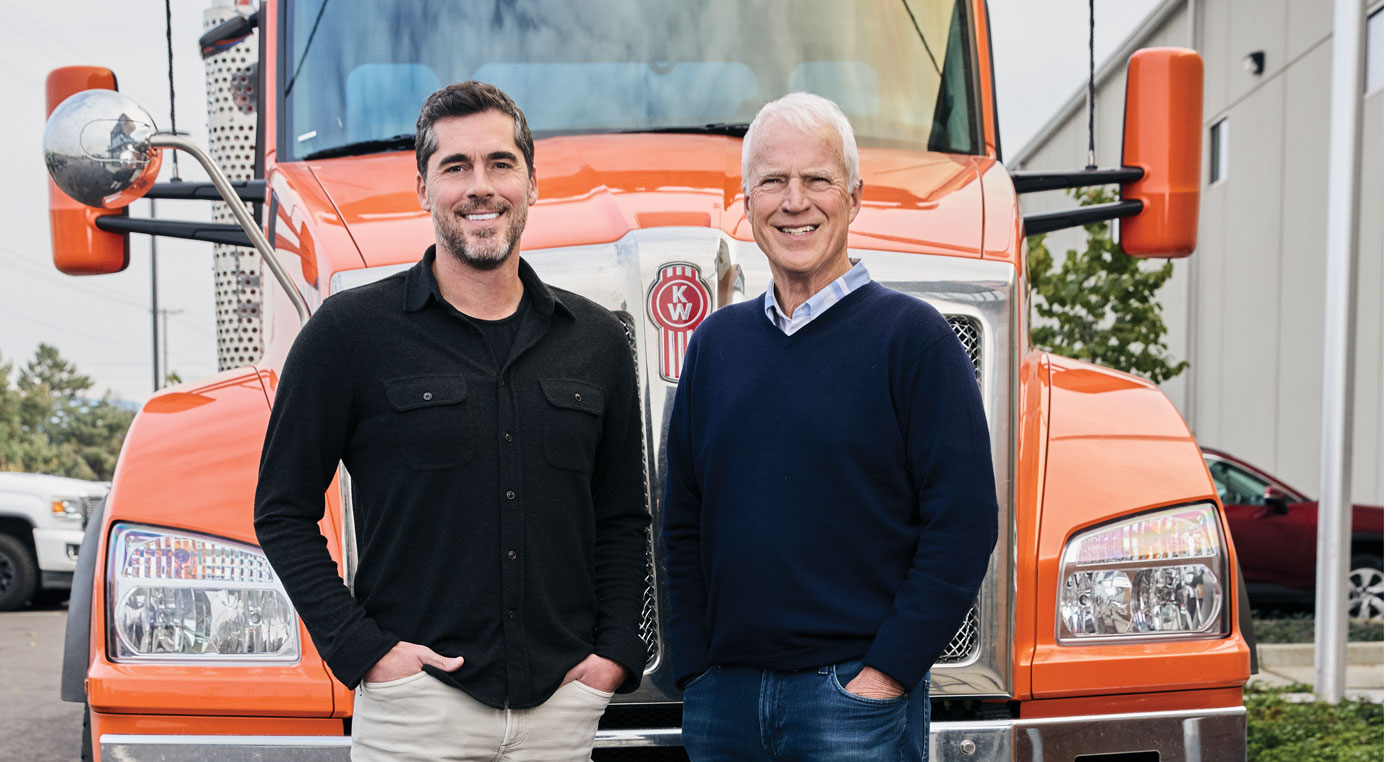
Tyree
Ron Tyree grew up in the state of Washington and worked for a major oil company for 15 years at locations throughout the West Coast. In Los Angeles, he met his wife, Gloria, got married, started a family, and transferred to Portland. “With our young family we looked at what we wanted to do in life, and we decided we liked the oil industry and enjoyed working with commercial and industrial businesses that used those products, but also wanted to stay in one community and not be transferred around,” Ron says. In 1988, they started Tyree with two employees, two trucks, and “almost zero business,” Ron says with a laugh. Today they have 220 employees, about 85 trucks, and 14 branch offices all along the I-5 corridor and in Kelso, Washington, providing tools, lubricants, and related petroleum services and fueling. Gloria deserves the praise for the company’s success, Ron says, because he could not have done it without her help in the business and on the home front. Ron was one of the first proponents of alternative fuels, with his investment in Sequential BioDiesel, the largest biodiesel plant in Oregon. Tyree was the first distributor in Oregon to bring those products to market. “We’re constantly looking at the type of energy that customers need and want,” says Ron. Trent Tyree says he started working for the company as soon as he was old enough to do so, washing trucks at 14. “I started at the bottom and learned the business by working through college at the University of Oregon,” Trent says. He went on to work in the hospitality industry in Arizona and Southern California for about eight years. “Then my dad and I started talking about what it would look like for me to come back and keep the company going, so I came back in February 2015,” he says. The company has optimized what they call reliability services, which help companies extend their equipment life and also use less oil by keeping oil very clean through filtering and other techniques. “The whole goal is to use less oil, use it more efficiently, and extend your equipment life at the same time,” says Trent. As far as working together goes, “we have the same goals, and we may differ about how to get there but we usually can find the common ground,” Trent says. “Many years from now, working together as a family will certainly be a great memory for me.” tyreeoil.com
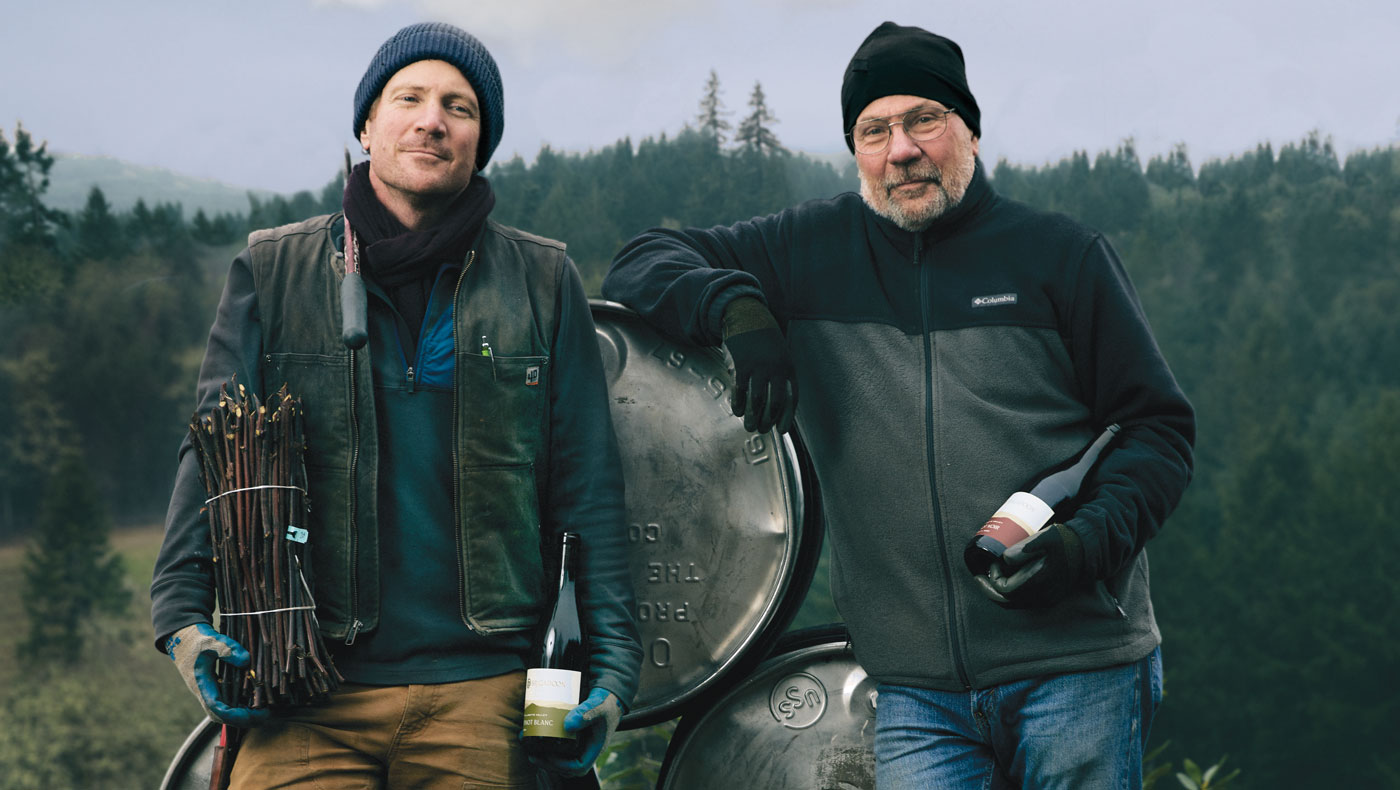
Brigadoon Wine Co.
Matt Shown’s parents, Chris and Sheree, bought the property for what is now Brigadoon Wine Co. in Junction City in early 1991 and started planting. “It was my dad’s side hustle and he planted roughly an acre a year, over 15 years to plant 15 acres,” Matt says. In the mid 2000s, Matt was working in the wine industry and started talking to his parents about starting a wine label of their own, because they liked the wine they made and they liked working together. In Matt’s mid-20s, winemaking “clicked” for him as something he enjoyed that involved science, being outdoors, being artistic, and working with his hands. Chris had worked at his father’s vineyard in Napa Valley while growing up in California, and after he and Sheree graduated from college he went back to work at the vineyard, “doing what I loved.” Finding the property here in Eugene provided the opportunity for Chris to develop a place of his own. Matt says one of the challenges of working with his father is navigating their roles of father and son along with creating new connections as coworkers. “I’ve learned more about my dad than had I not worked with him,” says Matt. “I’ve also, I think, learned more about myself as a result of working with him.” The pair embrace the idea of being a small winery and aren’t trying to compete with other well-known wine brands — in fact, they joke that “Brigadoon is the best winery you haven’t heard of.” They produce about 1,500 cases a year and are progressing towards 2,500. It’s hands-on work, with Sheree overseeing the day-to-day in the tasting room, Chris managing the vineyard and business, and Matt working in the vineyard and making the wines. Together, Matt and Chris are in the vineyard seven days a week, and when they aren’t outside, they are in the tasting room. “We’re possibly overly active but that’s how we like doing it,” Chris says. The name Brigadoon comes from a 1940s musical. In that story, two Americans discover a beautiful village in Scotland, called Brigadoon, that isn’t on any map. They soon discover that Brigadoon is an enchanted place that only appears once every 100 years for one day. “The idea of our winery being called Brigadoon is that it is a special place, removed from reality, tucked into the coastal foothills,” says Matt. “You can’t see anything else man-made from here. It’s magical.” brigadoonwineco.com
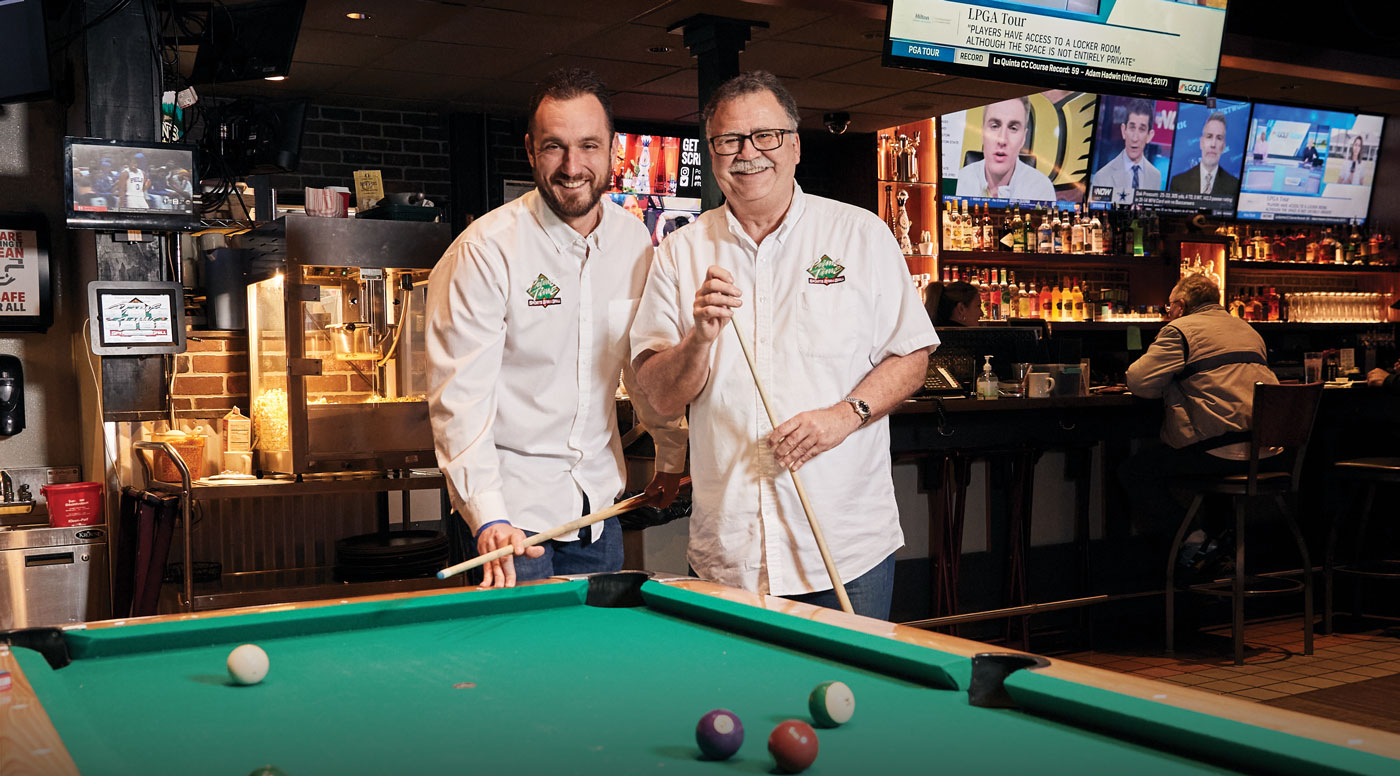
Prime Time Sports Bar & Grill
Jason Martorano and his step-father, Rich Hickam, have been part of each other’s lives since Jason was a small boy. Rich grew up in a family that had owned taverns and restaurants in the Springfield area since the 1960s, so in 1995, when Jason was starting his sophomore year of high school, it felt natural for Rich to start his own place. At the age of 15, Jason started helping out with early-morning janitorial shifts before school. “I did not always like the early mornings, but I’m glad I did it,” says Jason. He went to school for teaching, then decided to focus on the restaurant. “This place has grown since day one,” Jason says. “It just made sense to give it the attention it deserved, and it has thrived.” The Prime Time team has found a great combination of sports, delicious and affordable food, good service, and a comfortable atmosphere. “I’ve lived here all my life,” says Rich. “We live in this community so our clientele is our friends. Some of the same people have been coming in for 27 years and their kids have kids of their own now.” At first, Rich says, they wanted Prime Time to be “a tavern that sold a couple of sandwiches.” But the food became one of the primary draws, and now they have an extensive menu of favorites like hand-cut finger steaks and hand-battered fish and chips. Salads are cut fresh each day. And Rich says their homemade macaroni and cheese just might be the best you’ve ever had. “It takes an awful lot of people who care to keep a place like this running all day, every day, seven days a week,” says Rich. “In this business, you don’t get weekends off. You don’t get to rest at 6 o’clock at night when everybody else does.” Jason says if anyone hasn’t discovered Prime Time yet, they might be surprised at how big and nice it is, with a quiet corner for conversations, room for large groups, nice furnishings, and a well-maintained building. “We’ve also got a killer lottery area equipped with gaming chairs and service buttons, outdoor seating, and a long bar top with excellent TV viewing,” says Jason. “There’s really not a bad seat in the house!” primetimesporsbar.com
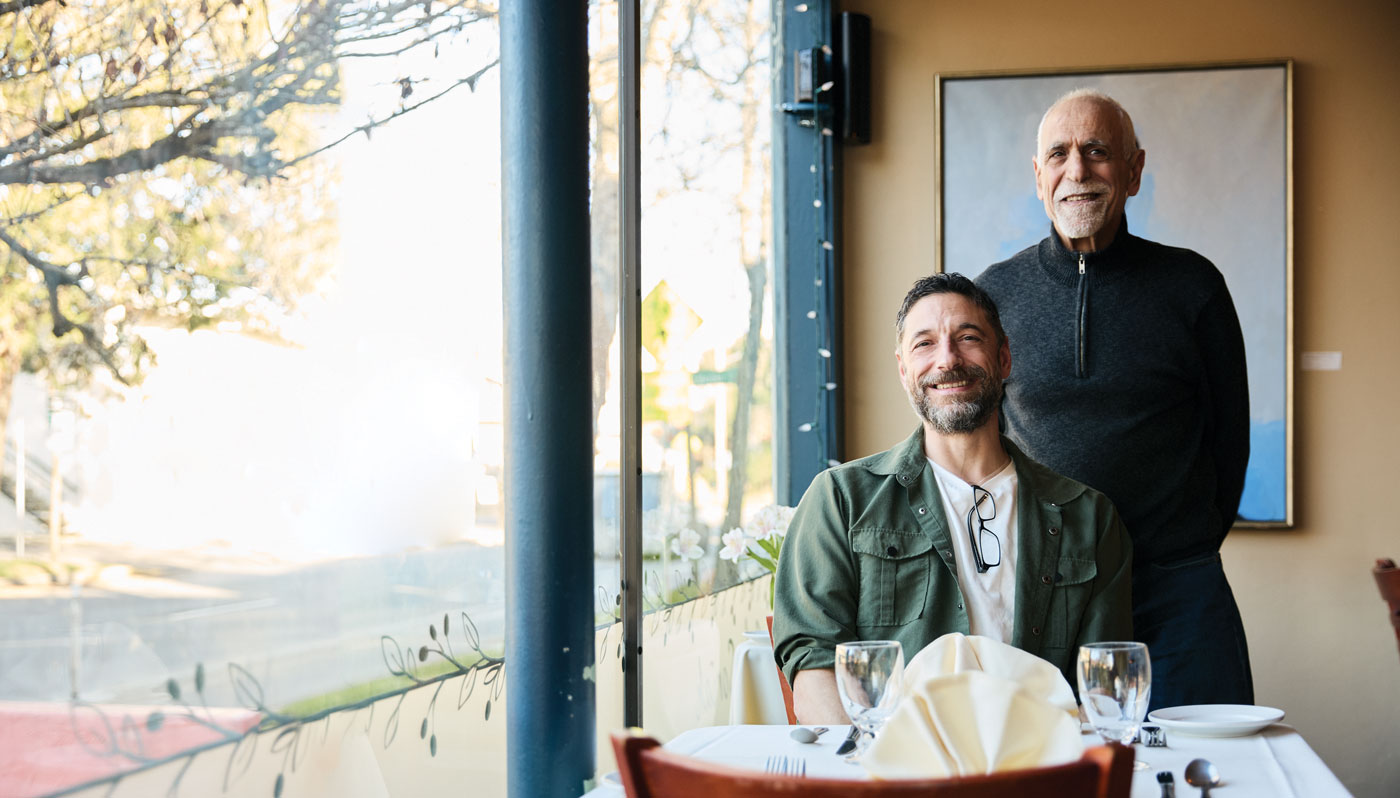
Cafe Soriah
Even if you don’t know Ibrahim “Ib” Hamide personally, you may know him from his dramatic tableside presentations of bananas foster at Cafe Soriah — and this year marks their 30th anniversary of serving classic fine dining and Mediterranean fare. Ib is also likely to be the person answering the phone, even though he has staff nearby who can do it. Cafe Soriah, open since June 1993, is owned by Ib and his son, Naseem. It is named for Naseem’s older sister. Ib grew up watching his father farm and his mother cook at home in Bethlehem, Palestine, where the family (Ib is the youngest of eight) got by with very few resources. “But food was our currency,” Ib says. Ib came to Eugene to study at the University of Oregon, with a plan to return to Bethlehem. He stayed after the Israeli occupation of his hometown and for years has strived for peace and understanding as a member of the city’s Human Rights Commission. He believes his restaurants have been successful not just because of the delicious food, like steak Diane or hummus, baba ghanooj, and dolmas, but because he adheres to his philosophy of hospitality and service. “We go the extra mile,” Ib says. “If you cannot be hospitable and give someone a smile, you’ve lost way too much.” Between Soriah and Ib’s other restaurant endeavors, Casablanca and Cafe Zenon, Ib says he always knew that restaurant work was what he wanted to do. And when it is time for Naseem to take over, don’t expect much to change. “My dad has built a wheel that is running smoothly,” Naseem says. “Thirty years ago, we had people coming in celebrating special occasions with the bananas foster and enjoying our nightlife here. Now, those kids are adults and have those memories and can bring their own kids here. I’m glad that we can stay connected to the community that way, and I hope to continue that.” Both Naseem and manager Alex Hernandez, who has been there 15 years, met their wives at Cafe Soriah. Hernandez says Soriah is a place where you can come every day and make new friends or visit with old friends. Naseem adds, “It can be a special occasion place — and we will treat you very well to remember your special occasion — but it can also be an everyday place where you come in just as you are, and you’ll be treated the same way.” soriah.com
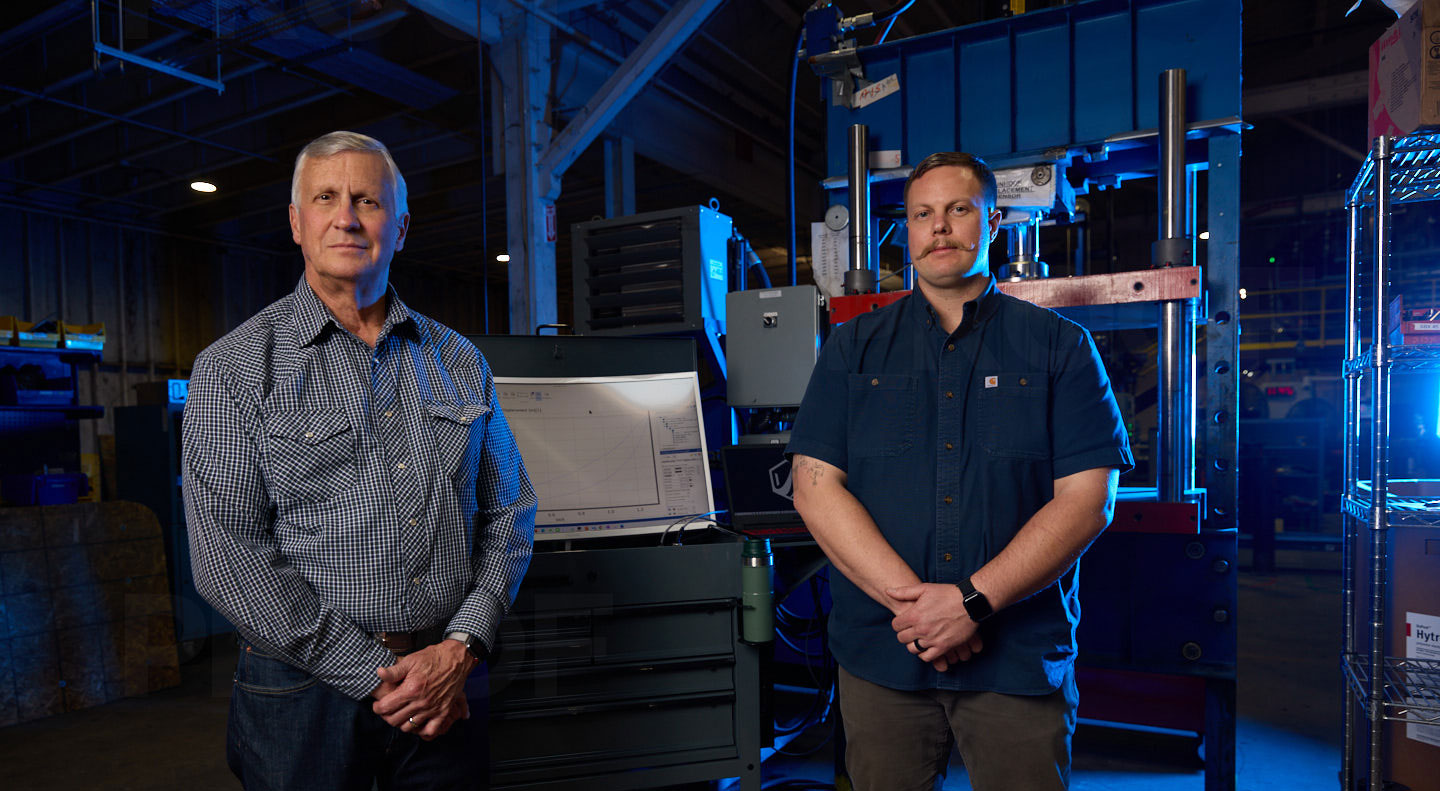
Advanced Elastomer Technologies
In 1999, Ron Sprainis moved his family from Chicago to Springfield to manage Emerald Rail Technologies. When Emerald Rail closed, Ron and his family wanted to stay, so Ron started Copoly Technologies to pursue an idea of replacing hydraulics and steel springs in coupler shock absorbers with elastomer shock absorbers, to update the existing 100+ year old technology. Elastomers are “elastic polymers,” or a rubbery material. The railroad industry was slow to adopt new technologies, so to make ends meet, Ron and his son John, who is also a mechanical engineer, worked together to develop several innovative industrial products ranging from a pencil eraser–size part used in robotic grippers up to very large shock absorbers for the Navy’s dry dock cranes. In 2013, their industrial product line was licensed for sale internationally. By 2016, Copoly Technologies had developed several railroad products that were growing rapidly. John joined the company and together, Ron and John developed an all-elastomer replacement for hydraulic cushioning units and found investors to fund a multimillion-dollar expansion. “Failing hydraulics cause derailments, so railroad companies were desperate for improved products,” explains Ron. When impact tests for BNSF Railway, one of the largest freight railroad networks in North America, were successful, demand for the product quickly soared. Ron and John started Advanced Elastomer Technologies in 2019, and the company expanded from a 3,000-square-foot facility to more than 30,000 square feet, and from four to 12 employees. Over the last few years, they have been working on improving their processes and have reduced scrap to 2%. “We have saved our scrap and this year will be implementing a recycling program with the goal of being a zero-waste company, which is unheard of in the plastics industry,” says John. Ron says he is the “gunslinger” in the company while John is “process-oriented,” and together they make a good team — although they did have to create a jar they put money into whenever they start talking about work at family get-togethers. In the end, though, they are able to find a meeting of the minds, they both say. advancedelastomer.tech
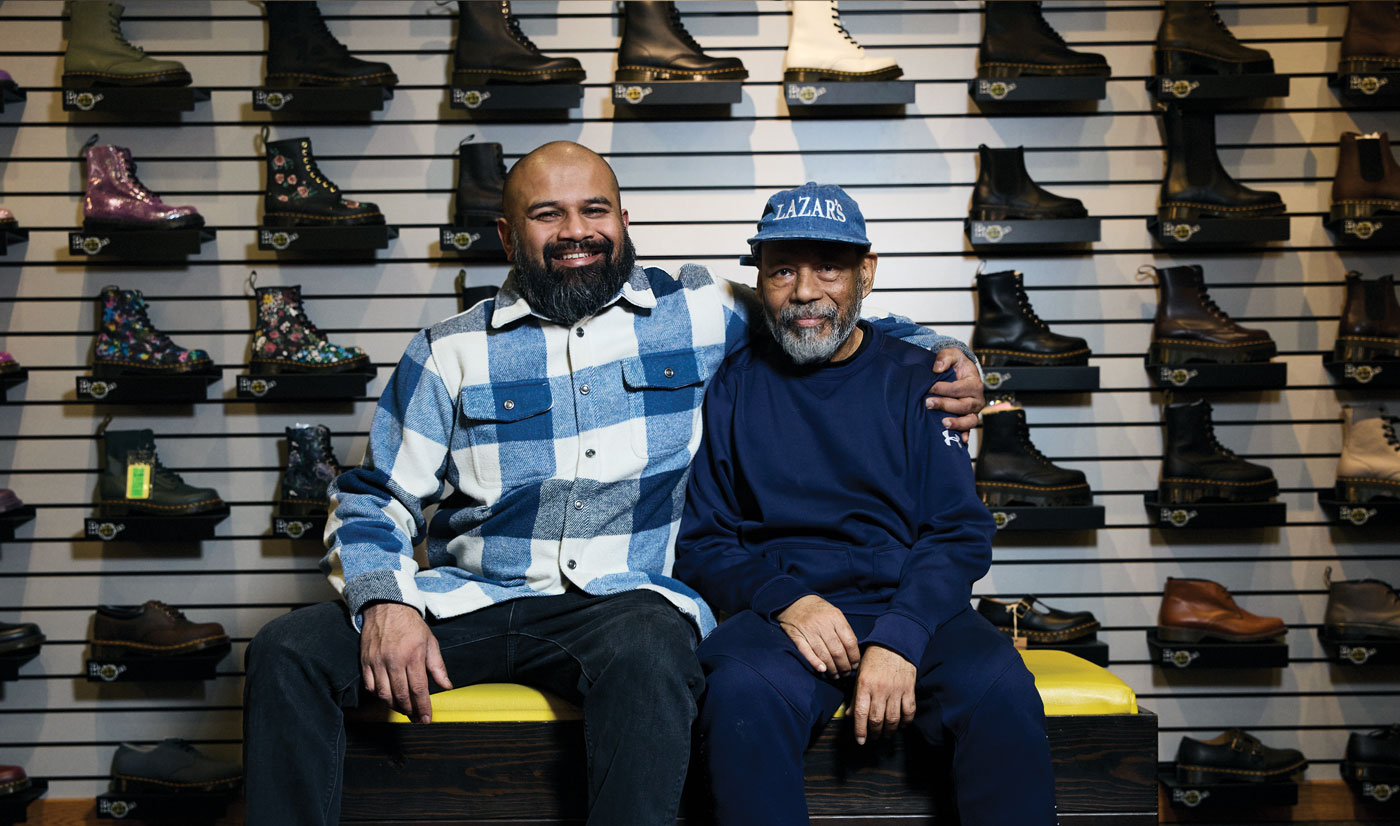
Lazar’s Bazar and Shoe-A-Holic
Lazar Makyadath and his wife, Rosie, moved to Eugene in 1974 — at that time a population of about 50,000 — from New Delhi, India — a population of more than 7 million. She was a nurse, he studied physics. When Rosie became pregnant, Lazar opted not to move the family to San Francisco, where he had a job offer from an Indian importer, and they stayed in Eugene. That connection to the importer proved fortuitous because Lazar’s Bazar got its start when he sold 12 tapestries door to door, then a few more tapestries, then other Indian items like incense. That expanded to music posters, lava lamps, hair dye, and just about anything else you can imagine. Priya, Lazar’s son, manages Shoe-A-Holic, which opened in 1992 to provide more space for Dr. Martens shoes, which became unexpectedly popular during the grunge heyday. Priya grew up watching the business, and first attended a tradeshow with his dad at the age of 10, when he wanted to buy a skateboard, which led to the store stocking skateboards. Lazar’s first store location was inside a “hippie mall” called Scarborough Fair at the corner of East 11th Avenue and Oak Street in downtown Eugene. Along with Lazar, other businesses that got a start there were The Kiva, The Birkenstock Store and a natural foods restaurant. Priya says working alongside his father means they sometimes butt heads. “We have different ways of doing things,” Priya says, “but we always work it out.” Each of Lazar and Rosie’s four children (they have 12 grandchildren now) have worked in the businesses. Lazar ran for mayor of Eugene in 2000 and 2004 with a focus on preserving the vitality of Eugene’s downtown area, and although he did not win in 2000 and pulled out of the race to allow Kitty Piercy to win in 2004, his businesses have helped ensure downtown’s continued success. With next year being Lazar’s 50th anniversary in business, he may be starting to think about retiring, but he says, “I just can’t sit still.” Priya says, “I think he’ll live to be 1,000, so we’ll just have to see.” lazarseugene.com, shoeaholiceugene.com
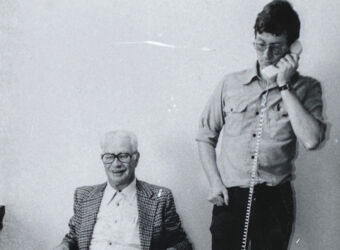 Saint Vincent de Paul
Saint Vincent de Paul
Terry McDonald is in his 52nd year with St. Vincent de Paul of Lane County and is nearing his 40th year as executive director. McDonald is the organization’s second executive director — his father, H.C. “Mac” McDonald, was the first. Mac was there at the start, helping set up a retail store to raise funds for a local SVdP group in 1950. Mac moved his family from Roseburg, where Terry was born in 1949, to Eugene in 1950. Terry first helped SVdP at age 10 by stamping donation bags with the organization’s phone number (DI 5-0595 in those days). In 1971, after Terry had graduated from college and was working for The Register-Guard’s circulation department, his parents took a trip around the world, courtesy of a brother who was an airline pilot. “I’d grown up knowing pretty much everything about it, so I said I would take over,” Terry says. Three months later, Terry decided to stay on and worked as his father’s assistant for four years — until his dad fired him. Luckily, they patched up their differences and Terry was rehired a year later. “I started to see that you could actually use business skills to create something that was for the common good,” Terry says. He saw the potential to grow small ventures into larger ventures, and he saw opportunities in items in the waste stream. Today, SVdP is an internationally recognized leader in developing waste-based enterprises that create jobs and provide sustainable revenue for nonprofit charitable efforts. “I am always looking to be able to do new things,” says Terry. “The idea of taking the waste stream of our community and turning it into community service is just something that tickles me. I really like it.” svdp.us
